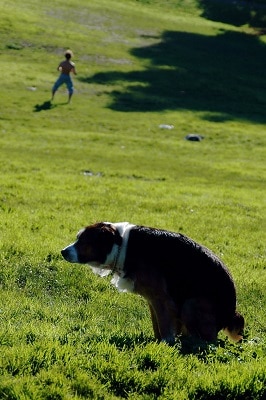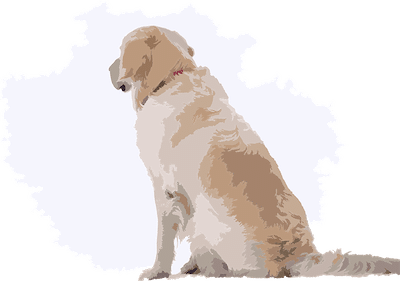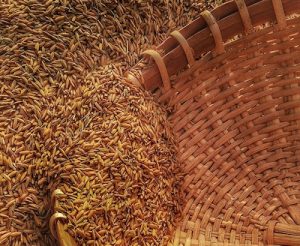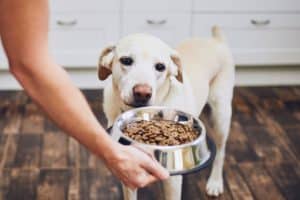Dogs have a naturally strong digestive system and unless they are fed things they shouldn’t or suffer from an illness they should poo healthy stools on a regular basis and they should not struggle to do so, either.
Owners looking for answers about why their dog may be struggling to poo will fit into four categories:
- Struggling to get the poo moving through the colon (constipation)
- A digestive blockage from constipation (obstipation)
- Unable to pass a foreign object
- Arthritis/joint problems/injury
We’re going to answer four questions in this article and give some quick tips on how to relieve it and prevent it in the future.
Constipation
Constipation is fairly common in dogs which may come and go – the main cause of constipation is a poor diet lacking in fibre or when they’ve eaten foreign objects and not being exercised enough. Fibre is a critical part of a dog’s diet which promotes a healthy digestive system and keeps things moving.
Dogs with chronic constipation may have an underlying condition which may result in a permanent change in diet which is higher in fibre, vitamins and minerals than regular foods along with a greater need for regular exercise.
Signs of constipation
- Not passed a stool in a couple of days
- Straining when trying to poo
- If they manage to poo, it is solid and hard
- Lethargy
- Swelling and redness around the anus
How to treat constipation
- If you’re feeding your dog a poor diet and they keep getting constipated then it’s time to upgrade to high fibre dog foods.
- Give them some exercise
- Use natural constipation treatments
- Offer them plenty of water
- Laxatives
- Visit a vet if it has been more than 2 days with natural treatments
Digestive blockage (Obstipation/megacolon)
Untreated constipation and allowing your dog to continue to struggle to poo without intervention can result in obstipation (sometimes referred to as megacolon) which means that the poo has now become so hard that it can’t be moved creating a blockage in the colon. The matter stuck in the colon has created a disease which has damaged the nerves in the colon resulting in permanent loss of control of the large intestine.
This is a painful condition with the same symptoms as constipation except with increased pain and discomfort in the dog, you may find your dog not wanting to eat and just lay there as moving can result in sharp pains.
Obstipation is unlikely to go away on its own and will require veterinarian attention and medicinal treatment.
Signs of obstipation/megacolon
- The same as constipation, along with;
- Increased and visible signs of pain
- Lack of appetite
- Vomiting
- Weight loss
How to treat obstipation/megacolon
Obstipation and megacolon often require surgery to remove the blockage and treat the colon directly, however, veterinarians would still recommend trying the same treatment as constipation before surgery due to the extreme cost of the procedure and the risks involved in doing so.
However, even after successful surgery, your dog will likely need to endure changes such as a permanent high fibre diet, regular laxatives, higher than normal hydration and routine exercise.
Inability to pass a foreign object

Lastly, dogs who have swallowed a foreign solid object that can’t be digested in the stomach and moved on to the colon can find it causing a blockage leading to constipation and then obstipation. This can be so much worse if the solid object is sharp such as a piece of glass as it can tear at the walls causing an extreme level of pain. Dogs will not only struggle to poo but will be in constant pain and may yelp and scream on top of the straining.
Signs of a stuck object
- The same as constipation and megacolon and;
- Severe pain and yelping
- Reluctance to move at all
How to treat it
If you fear a foreign object is stuck and your dog is clearly in severe pain then it’s time to go to an emergency vet asap. The object could be causing untold damage inside and every second count.
Arthritis/joint problems/injury
No matter the breed, a dog will always go for the squatting position to poo because that is the most efficient and comfortable way to do it. If a dog struggles to squat then they will struggle to poo. The main causes of a dog not being able to squat properly is arthritis, general joint problems or an injury that has not healed.
Squatting does take some effort and can put a strain on their muscles and legs – this one of the many reasons why old dogs become incontinent and struggle to both wee and poo.
Signs of arthritis, joint problems and injury
- Reduced mobility
- Limping as they walk
- Lack of appetite
- Visibly struggling to squat
How to treat arthritis, joint problems and an injury
An injury should be seen by a vet and will heal on itself if it’s not too serious. Arthritis and joint problems, however, are likely to stick around and become worse in time. However, steps can be taken to manage it and slow the progress of the disease down with joint supplements, more comfortable bed and to not avoid exercise as the cartilage can harden quicker without it.
In terms of pooping, it’s likely they can become incontinent so the best thing to do is to just prepare for the implications of that and not scold them for it.
Conclusion
A dog struggling to poo is not normal but the severity of it can differ. The number 1 cause of dogs finding passing faeces difficult is diet and a red flag that it needs to improve and their fibre intake are upped. What is also clear is that if it does not go back to normal after a couple of days then changes need to be made and a vet visit considered.
Related Articles




